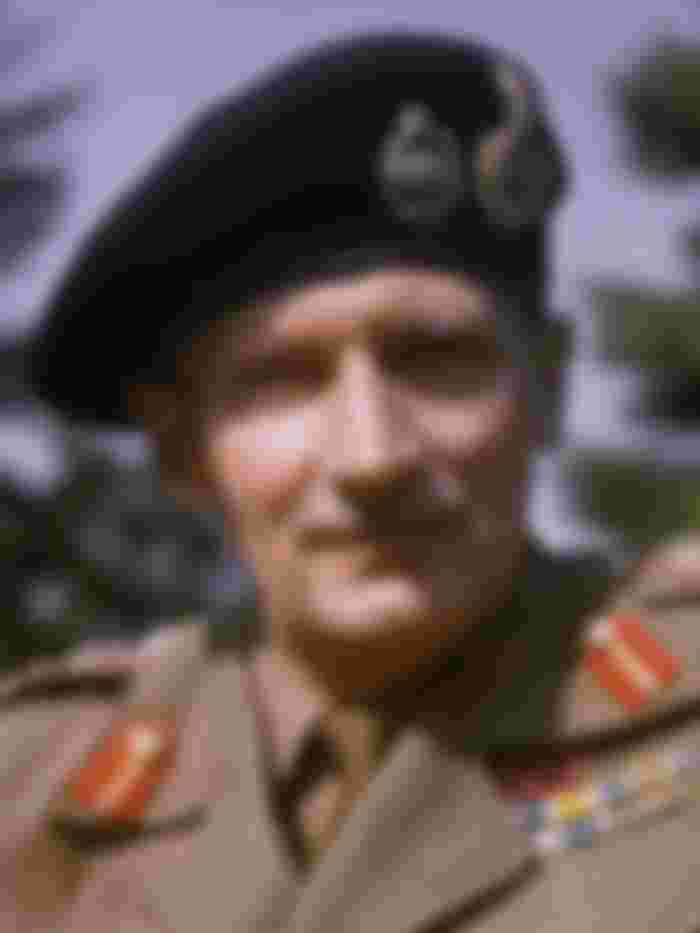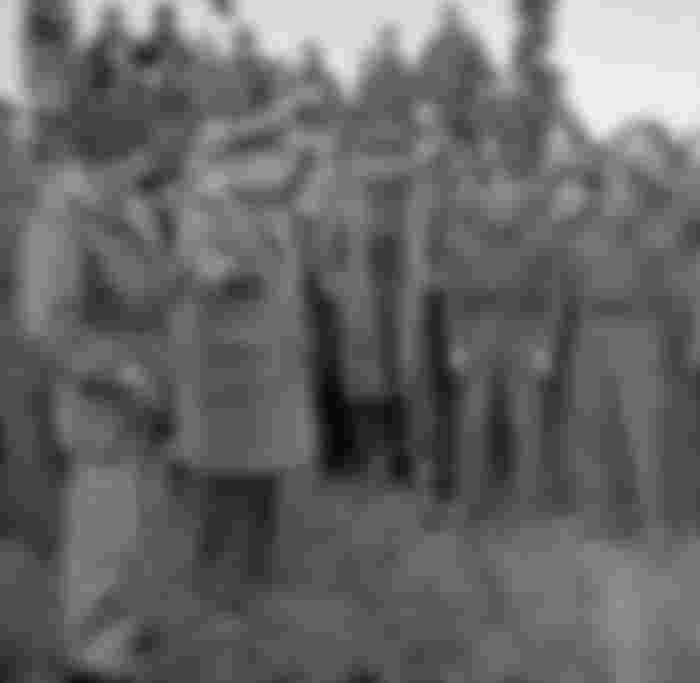General Montgomery is one of the few allied generals in World War II to have become world-famous and whose tactics have been the subject matter of generals in later countries. He is remembered for losing the famous German General Field Marshal Erwin Rommel. The full name of this very disciplined and outspoken British general was Bernard Law Montgomery, his nicknames were Monty and The Spartan General.
Montgomery was born on 18 November 1887 in Kennington, London. Father Henry Montgomery was a bishop of the church and mother Mod Montgomery was a very strict woman. Henry Montgomery was sent to Tasmania, Australia in 1889, and his family moved there. Montgomery had a difficult childhood due to the regular beatings of his mother while on the British colonial island of Tasmania.

When his family returned to England in 1901, Monty enrolled at St. Paul's School in London and graduated from the Royal Military Academy. He was commissioned in 1908 and joined the Royal Warwickshire Regiment as a second lieutenant.
In 1910, Montgomery was promoted to lieutenant and sent to India. But when World War I broke out, he was assigned to France with the British Expeditionary Force. Montgomery and his regiment took part in World War I from under the Fourth Division, led by Lieutenant General Thomas Snow. He was so badly wounded in the battle that his grave was dug! The opponent's sniper shot hit him in the lungs. But luckily he survived that journey.
When he recovered, Monty was promoted to the rank of Brigade Major by the British Expeditionary Force Distinguished Service Order. In 1916 he was reassigned to France as a Staff Officer of the 33rd Division. During this time he became known as an accurate planner, demonstrating outstanding skills in conducting integrated operations of the infantry, artillery and engineering corps. When the war ended in November 1918, Monty temporarily assumed the rank of Lieutenant Colonel and served as Chief of Staff of the 47th Division.
Later, during the Irish War of Independence or Anglo-Irish War of 1919-21, he stayed in Ireland with British forces and took part in various operations against the Irish Republican Army, a pro-independence guerrilla force. He was in favor of a tough stance on the rebels.

Monty, 39, returned to England after the war and married Elizabeth Carver. In 1928 their home was illuminated and a son, David, was born.
After several promotions, in 1931 he was promoted to Lieutenant Colonel and sent to British colonies in India and the Middle East. In 1937, his wife, Elizabeth, died prematurely from septicemia. In mourning, Monty conducted a massive military training the following year, which was widely acclaimed by his superior military officers. As a result, he was promoted to the rank of Major General and led the 8th Division. During this time he was assigned to British colonial Palestine. In 1936-39, when the Palestinian Arabs revolted to demand the independence of Palestine, including the abolition of the British mandate and the cessation of Jewish immigration, General Montgomery successfully suppressed the revolt.
Then, in 1939, when the Second World War broke out, the British government assigned him to France with the responsibility of elite division like 3rd Infantry Division. But this time Montgomery was cautious enough. Fearing that catastrophe of 1914, he relentlessly trained his subordinates in defensive tactics. Later, in 1940, Monty used this tactic when British troops on the north coast of Dunkirk, France, were surrounded by Nazis on three sides. Monty also survived the voyage from Dunkirk almost certain death.

Upon his return to England, Montgomery became an outspoken critic of the British High Command and became embroiled in trouble with Lieutenant General Sir Claude Achinlake, the commanding officer of the country's Southern Command. The following year, Monti was assigned to defend the south and south-east of England, along with General Harold Alexander. Because in the event of a possible Nazi aggression, his main concern was to pass through these two regions.
Losing Rommel
In June 1942, the British 8th Army was defeated by the Italian-German forces led by Erwin Rommel at the Battle of Gaza in North Africa. Somehow the British retreated and built a huge line of defense near the town of El Alamein. At the time, the Axis Powers in North Africa were advancing from west to east, aiming for the Suez Canal.
Sir Claude Achinlake, Commander-in-Chief of the Allied Forces in the Middle East, took command of the 8th Army in his own hands to encourage the devastated and demoralized Allied troops. The first battle that took place in El Alamein, Egypt was known as the First Battle of El Alamein (July 1-27, 1942). In this war the Allies were on the defensive and the Axis powers were on the offensive.
In August, British Prime Minister Winston Churchill visited Cairo and decided to remove General Achinlake and appoint General William Gott as commander of the 8th Army and General Alexander as commander-in-chief of the Allies in the Middle East. But he was killed when the Germans shot down General Gott's plane and was forced to replace him with General Montgomery as commander of the 8th Army. Monty's closest friend was General Alexander. Both had previous experience dealing with difficult situations. The combination of the two generals changed the fate of the Allies in the Middle East. General Alexander was tasked with coordinating the Anglo-American operation with the 8th Army. Monty, on the other hand, was responsible for losing Rommel.

Soon after taking charge, Montgomery began to plan how to defeat Rommel. Monty was able to realize that the normal principles of desert warfare had been violated here. So he planned to dig a trench like World War I instead of a tank vs tank war. Three weeks later, when Rommel launched the expected attack with his usual tactics, Montgomery avoided a tank battle by destroying half the tanks of Rommel's tank fleet with an anti-tank gun in the sand-drenched clamophage.
Then, on October 23, Montgomery embarked on his much-awaited campaign against Rommel, known as the Second Battle of El-Alamein (October 23-November 11, 1942). At the beginning of the war, Rommel also attacked fiercely. But Rommel was defeated because of a lack of necessary supplies, destroyed supply lines and airfields, and most of the tanks in the main power panzer division. Somehow he fled to the coast with his Africa Corps. Then one by one they took refuge in Tabruk, Derna, Benghazi to Tripoli and finally in Tunisia. Suffering from vengeance, Monty and his 8th Army chased Rommel. On the way, Rommel tried to resist twice, but Montgomery crushed him. Monty became famous overnight as a result of losing Rommel.

This war was one of the turning points of the Second World War. Because for the first time in this war, the British Commonwealth forces won against the Axis powers without the help of the United States, which increased their morale many times over. On the other hand, the Italian-German forces surrendered in Tunisia in 1943 after being defeated with heavy casualties. Through this the Germans were expelled from North Africa.
After the liberation of North Africa, the Allies conducted operations in the islands of Sicily and Italy, with Montgomery leading the British 7th Army.
Finally, on 6 June 1944, the Allies launched the largest amphibian attack on Normandy Beach in France, known as D-Day. The man behind the D-Day success is General Montgomery. Because General Eisenhower, being the supreme commander of the Allied forces, supervised everything in this operation, Montei was the mastermind behind the implementation of all the plans. On his shoulders was the leadership of the 21st Army Group, comprising all ground forces landing on Normandy Beach.

Monty was instrumental in planning this huge attack, from rehearsals to deceiving opponents. After landing at Normandy, the battles that led to the defeat of the Germans and the capture of the whole of northern France by the Allies were also the precise plans of Monty. As a result, in September 1944, the British government promoted him to the rank of Field Marshal, the highest rank in the British Army.
Montgomery planned the largest airborne operation in history, known as Operation Market Garden. The ambitious operation was aimed at avoiding the 630-kilometer-long, impenetrable German defense line 'Siegfried Line', using paramilitary and infantry forces to enter mainland Germany through the Netherlands and return home before Christmas. In the end, the operation failed due to the resistance of the Germans and many more reasons, but due to the bravery and determination of the soldiers who participated in this war, it became one of the best battles of the Second World War.

Meanwhile, on 16 December 1944, German forces launched the latest attack on the Allies on the Western Front, known as the Battle of Bulge. Originally through this attack, Adolf Hitler wanted to give his last bite on the Western Front. The war in Europe's bone-chilling winter has left US forces in a precarious position in the face of German aggression. Lack of necessary supplies, minus temperatures, and protracted wars resulted in the deaths of large numbers of U.S. troops. But later, when General Patton and General Montgomery attacked the Germans from two directions, the Germans retreated. In this way, Monty also played an important role in the battle of Balz.
In March 1945, Montgomery's precise plan led his troops across the Rhine to enter Germany. Finally, on March 4, 1945, all German forces stationed in Denmark, the Netherlands, and northern Germany surrendered to him.

At the end of World War II, he served first as Commander-in-Chief of the British Army and later as Deputy Commander of the Western Military Alliance NATO from 1951-58. In 1946, the British government introduced the title Viscount of Alamein in his honor and was the first to confer it on him.
His memoirs were published in book form in 1958. In later life, Monty became embroiled in a series of personal disputes. These include support for racists in South Africa and criticism of US tactics in Vietnam. He died on 24 March 1976 in Hampshire, England, one of the best generals of World War II.
Personality assessment
The slender, long-nosed Montgomery was rude, strict, and very disciplined. He disliked smoking and drinking. He was known as a somewhat insane, arrogant, stubborn and unyielding general. He used to dismiss his staff officers for minor irregularities. The harsh childhood made him a tough man.

As a general, Montgomery's attack had the impression of versatility. If he used the most advanced tactics in one war, he would apply another strategy in the next war. At least once a week, he ran seven miles of road from officer to brigadier. He used to go to the front every day. Field commanders would be shocked to learn more about the soldiers than they did.
Despite his complex character, Montgomery remains one of the best generals of World War II and one of the greatest generals of all time in the British Army. He is remembered in history for his impeccable role in World War II.
Thanks to everyone for reading my article








